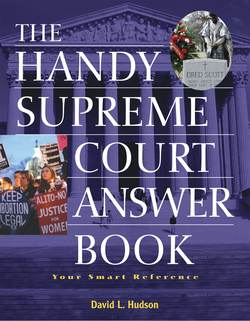Читать книгу The Handy Supreme Court Answer Book - David L Hudson - Страница 264
На сайте Литреса книга снята с продажи.
In what decision did the Taney Court uphold the Fugitive Slave Act of 1793?
ОглавлениеThe U.S. Supreme Court upheld the constitutionality of the federal Fugitive Slave Act of 1793 in Prigg v. Pennsylvania (1842), while striking down a Pennsylvania state “personal liberty” law that conflicted with the Fugitive Slave law. The case involved professional slavecatcher Edward Prigg, who tracked down former slave Margaret Morgan and returned her to her Maryland owner, Margaret Ashmore.
Prigg returned Morgan to Maryland without obtaining the required certificate under federal law because a Pennsylvania state judge refused to issue him one. Pennsylvania authorities then charged Prigg with kidnapping. The two states fast-tracked the litigation and it reached the U.S. Supreme Court.
In his opinion, Justice Story wrote: “Upon these grounds, we are of opinion, that the act of Pennsylvania upon which this indictment is founded, is unconstitutional and void. It purports to punish as a public offence against that state, the very act of seizing and removing a slave, by his master, which the constitution of the United States was designed to justify and uphold.”
CourtSpeak: The Amistad Slavery Case (1841)
Justice Joseph Story (majority): “It is also a most important consideration in the present case, which ought not to be lost sight of, that, supposing these African negroes not to be slaves, but kidnapped, and free negroes, the treaty with Spain cannot be obligatory upon them; and the United States are bound to respect their rights as much as those of Spanish subjects. The conflict of rights between the parties under such circumstances, becomes positive and inevitable, and must be decided upon the eternal principles of justice and international law …. The treaty with Spain never could have intended to take away the equal rights of all foreigners of the protection given them by other treaties, or by the general law of nations. Upon the merits of the case, then, there does not seem to us to be any ground for doubt, that these negroes ought to be deemed free; and that the Spanish treaty interposes no obstacle to the just assertion of their rights.”
